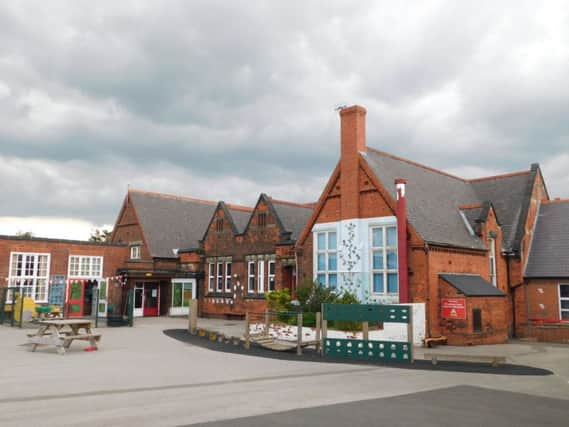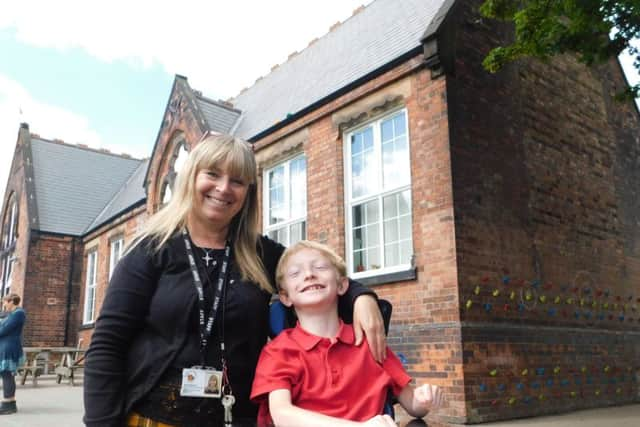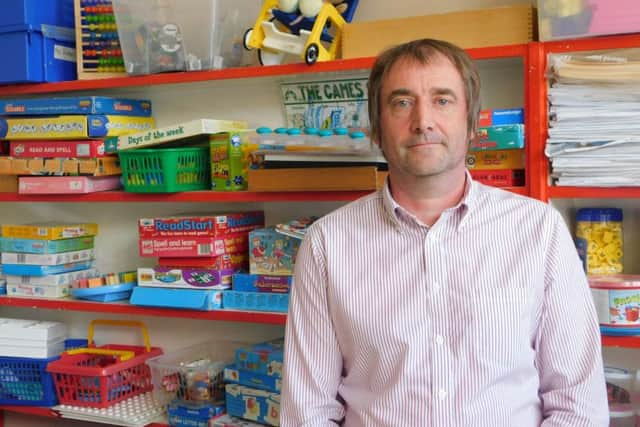Teachers at cash-strapped Chesterfield school ‘dipping into their own pockets’ to buy vital equipment


Brampton Primary School’s head teacher says funding shortages have “compromised” its ability to offer a quality education for all of its 345 pupils.
Wayne Parkinson said this is because funding has had to be directed at providing proper support for children with special educational needs (SEN), away from much-needed repairs to the school itself or general support for all pupils.
Advertisement
Hide AdAdvertisement
Hide AdThe school, on School Board Lane, Chesterfield, has developed a reputation for the quality of care it provides for children with SEN, of which it has a disproportionate amount.


Samantha Gasgoyne, who has been a teaching assistant at Brampton for the last 12 years, says that she and her fellow staff are having to give an increasing amount of their own time to help keep the school going.
She says that staff buy their own resources to help ease the financial burden on the school, with teachers frequently scraping every last ounce out of glue-sticks.
Alongside this, an increasing amount of school-fundraisers such as discos are being arranged to bring in badly-needed funds.


Advertisement
Hide AdAdvertisement
Hide AdMrs Gasgoyne said: “Realistically, how can you do the job, if you haven’t got the resources? So we are buying extra things at our own expense.”
Mr Parkinson says that parts of the building are clearly in need of a repair or a repaint, but the budget will not stretch – it has been directed at SEN funding and making the school fit for these pupils.
This includes marking out steps with yellow paint or tape and fitting classrooms with blinds.
Meanwhile, children at the school say that they have noticed a decrease in available resources, such as pencils and glue-sticks, which are not quickly replaced.
Advertisement
Hide AdAdvertisement
Hide AdDue to its burgeoning reputation, parents bring their kids to the school from all over Chesterfield.
As a result, there are currently 11 pupils at the school who are on Education, Health and Care Plans – legally-binding documents between the parent, school, child and county council which dictate the support they require.
Many more children are also on the special needs register or are simply yet to be diagnosed, like six-year-old Marie Allen, whose family believe is on the autistic spectrum.
Her mother, Ellen Allen, believes that diagnosis is just a matter of time.
Advertisement
Hide AdAdvertisement
Hide AdFormal diagnosis has so far taken more than a year and a half.
She said: “I don’t want her to have a label (being diagnosed as autistic) or to put her in a certain box, but without the label, we can’t get her the help she needs.
“She needs managing consistently or she does not stay on task, she needs an extra pair of eyes on her to keep her on track, otherwise she falls behind and is then playing catch-up.
“But there are no free staff to provide that for her.
“She is bright and capable and Brampton are fabulous, but they just don’t have enough funding.
Advertisement
Hide AdAdvertisement
Hide Ad“It needs more money for more teaching assistants to provide help for kids like Marie in the classroom.”
Meanwhile, four-year-old Harley Beckett is autistic and is non-verbal.
He does not speak, but often yells to communicate.
His mother, Jade Frost, says that Harley also does not communicate when he is physically hurt or when he has been hurt emotionally.
She said: “He had an allergic reaction once and we had no warning from him until his face had swollen up.
“He has more advanced needs and requires one-to-one care.
Advertisement
Hide AdAdvertisement
Hide Ad“We drive 15 minutes out of our way in good traffic, leaving at 8.10am to get to Brampton from Hasland.
“I do feel like it is an uphill battle for parents like us, we feel taken advantage of, and especially if you don’t know how the system works.
“Luckily they are plenty of parents at Brampton who know the system in and out, we have to become experts.”
Jade has been pursuing an EHC Plan for more than 20 weeks for Harley and has just received the first draft.
Advertisement
Hide AdAdvertisement
Hide AdDerbyshire County Council is responsible for more than 3,000 EHC Plans.
The total time an EHC Plan is supposed to take from start to implementation is 20 weeks, with the county council aiming to do this in two to three weeks.
Most schools have an average of four pupils on EHC Plans, however, and the cost of required support can be lofty.
For example, the provision for one child, 10-year-old Josh Higginbottom, who is a wheelchair user and has quadriplegic cerebral palsy, costs £25,000 a year.
Advertisement
Hide AdAdvertisement
Hide AdSchools must pay the first £6,000 of provision for each child, but simply cannot afford to pay for all the required support.
The rest is supposed to be covered by Graduated Response for Individual Pupils (GRIP) funding.
But this is said to be slow, difficult to access and has limitations.
Parents say that teachers “do what they can” and are eager to provide as much help as possible.
Advertisement
Hide AdAdvertisement
Hide AdThey say that the main issue lies with funding for SEN from central government.
Several parents say that their children have been turned away from other schools because they are “too expensive to look after”.
Due to this, they welcome Brampton as a place that will accept their children and make the necessary arrangements and funding sacrifices.
The school says it has a shortfall of £42,000.
This is the first £6,000 the school is required to pay for special educational support for seven pupils with EHC Plans.
Advertisement
Hide AdAdvertisement
Hide AdAlongside this, the school’s general budget is down more than £200,000 from last year – falling from £1.37 million to £1.17 million.
“Top-up” funding is available to support children with SEN, including changes to the school building itself, but at Brampton, this, within a year, has fallen from £48,000 to just £900.
As a result, Mr Parkinson has had to make one teacher, four general teaching assistants and six specialist learning assistants redundant in the past two years.
These are teachers that are often assigned directly to a child who has significant special educational needs.
Advertisement
Hide AdAdvertisement
Hide AdMr Parkinson, who has been a head teacher for 20 years, said: “We have had significant reductions in staffing, more than I have ever seen before.
“To its credit, when Derbyshire (county council) has had the money, we have got the money, they have listened to us and do what they can, but the issue lies with government funding.
“We have been hit by the impact of two different funding streams being reduced, and this hit us hard and was done without any real consultation.
“I’m sure it was communicated in some way in small print but not as headline news to head teachers.”
Advertisement
Hide AdAdvertisement
Hide AdWhen asked if the school would have to stop accepting kids with special educational needs due to budget pressures, Mr Parkinson said: “I would absolutely, categorically never do that.
“It is certainly getting to the point where we have had to choose between accepting more pupils with SEN at the risk of seeing a drop in good quality education for the whole school.
“We are one of, if not the most, inclusive schools in Derbyshire but even I had got to the point with one child where we just did not have the money to fund all of their support, and I had to tell their parent this.
“I gave myself a pep talk and prepared to make the difficult decision, but in the end I decided that I couldn’t do it, it is just the right thing to do to take in the child and provide for them.
Advertisement
Hide AdAdvertisement
Hide Ad“We are having to make difficult decisions. Parents put a lot of trust in us.”
He says this comes down to a drop in funding being passed down from central government to local authorities and academy trusts.
Pupils speak highly about the level of support they receive from teachers, whether they have special educational needs or not.
Reuben Preece, aged 11, has severe visual impairment which makes it difficult for him to see objects that are far away.
Advertisement
Hide AdAdvertisement
Hide AdHe said when he is worried, a teacher is “always there to help me, I can always talk to my teacher or my TA (teaching assistant)”.
The school has specialist equipment called Prodigi, a table-top magnifier.
Pupils with needs such as Reuben or who are in wheelchairs, like Josh, have their own desks in their classrooms to better meet their needs.
Pupils Isabelle Hodgson and Lucy Gee – both aged 11 – say that teachers help to boost their confidence and are always available for help and will also make sure that pupils look after each other.
Advertisement
Hide AdAdvertisement
Hide AdBoth Isabelle and Lucy say they make sure pupils with SEN are included in activities, even if they are finding it more difficult.
But parents such as Jade and Ellen are all too aware that their kids require one-to-one support, support that cannot be given within Brampton’s crumbling and strained budget.
They both say that the school provides more for their children than any other school.
But it is clear, they say, that the school needs more staff and more resources – which all requires an increase in funding.
Advertisement
Hide AdAdvertisement
Hide AdTeacher Sharon Smith says that schools like Brampton “that are inclusive schools, may not be able to exist anymore, because we won’t have the funding”.
Derbyshire County Council had not supplied a comment at the time of this article’s publication.
A Department for Education spokesperson said: “Our ambition for children and young people with special educational needs and disabilities is exactly the same as for every other child and young person – to achieve well in school and college, find employment and go on to live happy and fulfilled lives.
“We have increased high needs funding for children and young people with the most complex special educational needs and disabilities, from £5 billion in 2013 to well over £6 billion this year.
Advertisement
Hide AdAdvertisement
Hide Ad“In December 2018, we also announced an additional £250 million up to 2020. Derbyshire has received £70.3 million in high needs funding this year.”
It says that Brampton Primary School has attracted 5.9 per cent more funding per pupil, compared to 2017-18.
The DfE says this is well above the primary national average of 2.7per cent per pupil.
Eddie Bisknell , Local Democracy Reporting Service